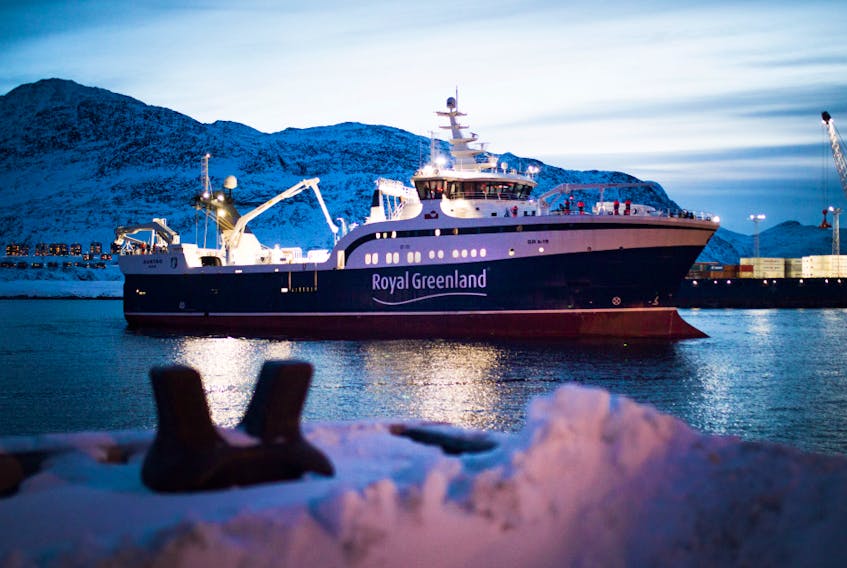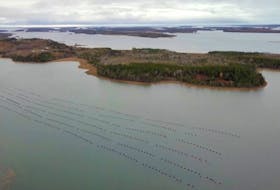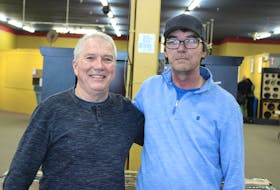The man who heads the department responsible for Newfoundland and Labrador's fish processing industry says the provincial legislature will not, and should not, get involved in making decisions about fish processing licences in the province.
Elvis Loveless was responding to a call from the Fish Food and Allied Workers Union (FFAW) the previous day for the minister to stop the sale of Quinlan Brothers to Quin-Sea/Royal Greenland.

In a press release Sept. 22, FFAW president Keith Sullivan said the application to transfer Quinlan Brothers shares should be put to a debate, and a vote, in the House of Assembly.
Loveless told SaltWire Wednesday the current process, whereby the arms-length Fish Processing Licensing Board reviews applications and makes recommendations to the minister, has been in place for more than a decade and he has no intention of abandoning it.
Loveless said the licencing board was created around 2004 as a result of the Dunne Report commissioned by the province. That report, authored by the late Eric Dunne, former director of the Department of Fisheries and Oceans (DFO), consulted with various members of the fishing industry, including fish harvesters and the FFAW.
One of the recommendations of that report was to create the fish processing licencing board. In fact, former FFAW president Richard Cashin, was appointed the first director for that board. The position is currently held by former secretary-treasurer of the FFAW, Reg Anstey.
“The spirit of that report was to remove decisions like these from the hands of politicians,” said Loveless. “And that’s where it’s going to remain.”
Then there’s the question of whether there would be legal liability if the minister was to renege on an approval already given for the licence transfer.
Loveless would offer no comment on that.
The final say on foreign acquisition of Canadian companies does not rest with the province.
Foreign ownership falls under federal jurisdiction and is governed by federal legislation.
The federal Department of Innovation, Science and Economic Development is responsible for monitoring foreign investment in Canada through the Investment Canada Act.
A spokesperson for the department responded to questions from SaltWire.
“As with any investment that may involve the acquisition of a Canadian business, we would assess the potential application of the Investment Canada Act to the transaction,” the spokesperson said.
"Net benefit review is required under the Act if the enterprise value of the Canadian business to be acquired is above a certain threshold.
For 2020, the relevant threshold for investors who are state-owned enterprises from countries that are WTO-member states, is $428 million in asset value, pursuant to ss.14.1 of the Act.
For investors from WTO-member countries who are not trade-agreement partner countries, the threshold is $1.075 billion in asset value.
However, the department could not offer comment on specific investments, due to the confidentiality provisions of the Act.
Loveless said he's heard of no issues on Ottawa's end.
“From discussions I had regarding this particular transaction, there were no concerns by the federal government.”
The news of approval of the transfer of Quinlan Brothers processing licences to Quin-Sea/Royal Greenland promoted numerous comments from Newfoundland and Labrador fish harvesters on social media.
The FFAW also raised concerns that the acquisition of Quinlan Brothers creates three "super" processing companies in the province.
“The elimination of Quinlan Brothers as competition means that three large processing companies now control approximately 75 per cent of all fish processing in the province, and close to 85 per cent of the lucrative shellfish processing in the province, which has an export value in excess of $500 million per year,” the FFAW president said in a news release.
“It is well-established that competition, wages and price suffers as corporate concentration increases in a free-market system,” Sullivan said. The union boss alleges fish harvesters in the province have already felt the effects of corporate concentration as “companies have worked together to limit the ability of harvesters to change buyers.”

The provincial fisheries department confirmed The Barry Group, Ocean Choice International (OCI) and Royal Greenland affiliated plants are the largest three processors in the province, based on a four-year average of reported processing production.
However, the department countered the statistical information presented by the FFAW.
“Barry’s, OCI and Royal Greenland affiliated processing plants process approximately 55 per cent of all fish processing in the province, and 57 per cent of shellfish,” the department noted in a follow-up statement.
Still, Loveless acknowledged the issue of corporate concentration in fish processing is a matter that needs to be examined, and he is open to review of the province’s policies and legislation.
“I want to engage in a process whereby we will be consulting with the board and other stakeholders.”
However, Loveless would not say how, or when, that process would happen.
Meanwhile, the minister noted, many other industries in this province have benefited from foreign investment.
With respect to Royal Greenland, the minister said that company has invested $21 million in the province since its purchase of Quin-Sea in 2016.
He is confident the company will continue to invest in local communities through the Quinlan Brothers transaction and the joint venture with Halifax-based Clearwater Seafoods at St. Anthony Seafoods.
“They are going to invest in those other communities,” he said, “and provide jobs,” he said, noting Royal Greenland is already providing jobs for about 600 people in the province at various times.
“So I think that should be noted because is it a benefit for the industry in this province. And I look forward to seeing the benefits of these (recent) transactions.”









